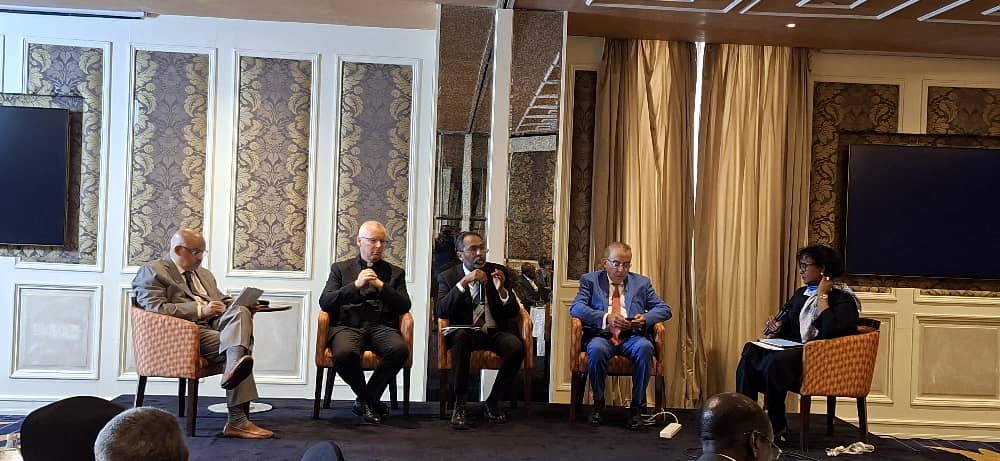 From Right: Amb. Amina Mohamed, former Foreign Minister of Kenya; Mongi Hamdi, former Foreign Minister of Tunisia Khalid Omer Yousif, Leadership Member of "Sumood" Alliance Vatican Ambassador in Nairobi Ali bin Abi Talib, former Sudanese Ambassador to the Human Rights Council during the meeting in Nairobi on September 11, 2025./HANDOUT
From Right: Amb. Amina Mohamed, former Foreign Minister of Kenya; Mongi Hamdi, former Foreign Minister of Tunisia Khalid Omer Yousif, Leadership Member of "Sumood" Alliance Vatican Ambassador in Nairobi Ali bin Abi Talib, former Sudanese Ambassador to the Human Rights Council during the meeting in Nairobi on September 11, 2025./HANDOUT
A fresh push for peace in Sudan gathered momentum in Nairobi on Thursday, where African and international leaders warned that the country’s two-year war cannot be won militarily and called for an urgent African Union–led political settlement.
The high-level forum, convened by the Kofi Annan Foundation, the Ambassador Amina Live Foundation, and the Maghreb Media Centre, sought to reignite stalled peace efforts and rally global attention to a conflict described as one of Africa’s worst humanitarian catastrophes in decades.
No Military Victory in Sudan
Speakers dismissed the prospect of a military solution, accusing Sudan’s army of blocking earlier initiatives—including the Jeddah talks in mid-2023, the Manama negotiations later that year, and the Geneva discussions in early 2025.
Delegates said both warring factions and their allied militias have committed grave abuses against civilians, and pressed for immediate humanitarian access across the country.
“A Humanitarian Catastrophe” Former Kenyan Foreign Affairs CS Amina Mohamed said that the war has displaced millions into neighbouring countries and risks pushing the region into deeper instability.
“The only way to end this war is through a credible and inclusive political process,” she said, urging the international community to raise awareness, increase support for peace, and push Sudanese actors into dialogue.
Regional Stability at Stake
Former South Sudan foreign minister Barnaba Benjamin warned that the war’s consequences extend far beyond Sudan. He cited the spread of extremist groups and Islamist militias as key drivers prolonging the conflict, and cautioned that the emergence of rival governments could worsen the crisis. Still, he voiced hope that the African Union would play a stronger role in shaping peace.
Militias and Extremism Fuel the Conflict
Former Sudanese cabinet affairs minister and Sumood Alliance leader Khalid Omar Yousif highlighted the growing threat of militias and extremist factions.
He accused the Sudanese army of deploying chemical weapons, called for an international investigation, and warned that collapsing services—food, healthcare, education, electricity and water—alongside economic freefall and the devaluation of the Sudanese pound, were pushing Sudan to the brink.
“Islamists are fuelling the war with hate speech, racism, and calls for separation,” Yousif said.
Sudan’s Forgotten War Former Tunisian foreign minister and ex-UN envoy to Mali, Mongi Hamdi, lamented that Sudan’s war has become a “forgotten conflict” despite its staggering human toll.
He warned that foreign militias from Ethiopia and Chad were further destabilising the country, and insisted that only a political solution can bring peace. The forum closed with a resounding call for political negotiations, regional unity, and stronger international engagement.
A copy of the final communiqué declared: “The people of Sudan have suffered enough. Continued reliance on military solutions only deepens the cycle of violence, destruction, and despair. No battlefield victory can bring peace, justice, or stability to Sudan—only a comprehensive political solution can achieve that.”
The statement urged IGAD, the AU, and the UN to act decisively, pressing both the Sudanese Armed Forces and the Rapid Support Forces to halt hostilities and return to talks. Humanitarian Toll According to the UN Office for the Coordination of Humanitarian Affairs (OCHA), more than 10 million Sudanese have been displaced since the war began.
Fighting in Kordofan and Darfur has left over 500,000 trapped in camps, while an estimated 75% of women face severe health and protection risks.
Meanwhile, shortages of food, medicine, education, electricity, and clean water continue to deepen, as the unchecked spread of weapons and militias drives the country further into chaos.



















